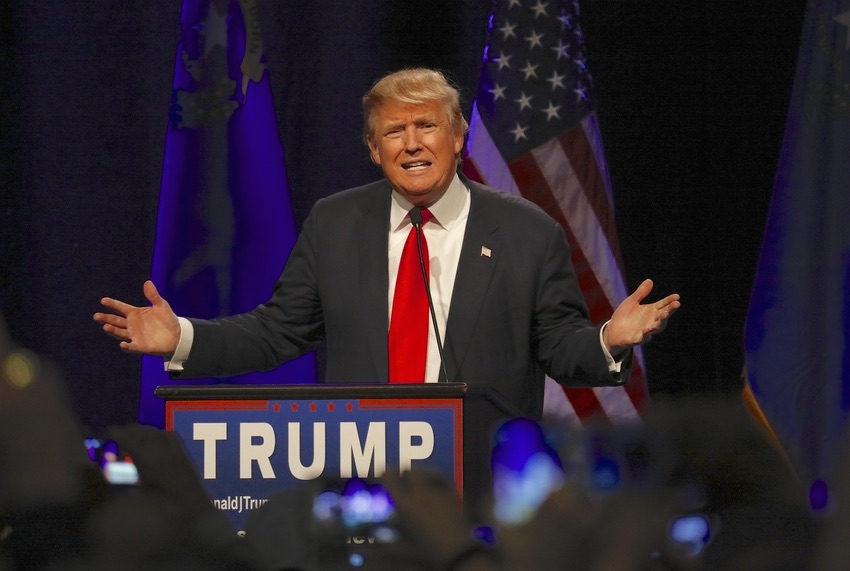Trump's Broken Speech Appeals to the Masses

When Donald Trump talks, he doesn't sound like an ordinary presidential candidate. His sentences are fragmented. He jumps around. On paper, his words appear garbled.
But there may be a good reason why this seeming incoherence hasn't hurt Trump in the Republican run for the presidential nomination: Trump's talk mirrors typical conversation, bolstering his status as an honest outsider.
"[Trump's] unique rhetorical style may come off as incoherent and unintelligible when we compare it with the organized structure of other candidates' answers," Georgetown University linguist Jennifer Sclafani told Live Science. "On the other hand, his conversational style may also help construct an identity for him as authentic, relatable and trustworthy, which are qualities that voters look for in a presidential candidate." [Quiz: Bizarre Presidential Elections]
Talking Trump
Trump's style is different from that of most modern public speakers. He has an especially repetitive style, University of Pennsylvania linguist Mark Liberman has pointed out on the blog Language Log. In a December post, Liberman excerpted a sample of an interview with Trump in which he was asked how to defeat the Islamic State group. Trump's response included variations of the phrase "bomb all these sites" three times in quick succession:
Well, if I were president, we probably wouldn't be in the problems we have right now, because it's incredible — we have an attack, and then all of a sudden, we bomb all these sites. Why didn't we bomb the sites before? We should have bombed the sites a long time ago.
Trump's vocabulary is also less diverse than other candidates', Liberman found, and his repetition tendency is a major cause of that. Trump also uses short verb phrases, which seem simplistic on their face, Sclafani said. She cited an example about immigration from the Feb. 25 Republican debate, in which Trump said:
Get the world’s most fascinating discoveries delivered straight to your inbox.
But, we either have a country, or we don't have a country. We have at least 11 million people in this country that came in illegally. They will go out. They will come back — some will come back, the best, through a process. They have to come back legally. They have to come back through a process — and it may not be a very quick process, but I think that's very fair, and very fine.
Germanic verb phrases like "come in," "go out" and "come back," are shorter and lighter than Latin-derived alternatives like "immigrate" and "deport," which Trump avoids, Sclafani said. But those simple phrases allow for parallel constructions like, "They will go out. They will come back" — which mirrors the parallel, "We either have a country, or we don't have a country."
"Despite the lack of logical coherence in his response, the simplicity and rhetorical structure of his statements may be appealing on another level," Sclafani said. [Oh Snap: 10 Memorable Political One-Liners]
An outsider's voice
Trump's rhetoric stands in sharp contrast to that of his opponents. Take this now-infamous tidbit from the March 3 Republican debate in Detroit, when Trump responded to a question about fellow candidate Marco Rubio attacking him personally in the preceding days:
Well, I also happened to call him a lightweight, OK? And I have said that. So I would like to take that back. He is really not that much of a lightweight. And as far as — and I have to say this, I have to say this. He hit my hands. Nobody has ever hit my hands. I have never heard of this. Look at those hands. Are they small hands? And he referred to my hands — if they are small, something else must be small. I guarantee you, there is no problem. I guarantee.
In contrast, Rubio started with a classic politician's segue when asked about the back-and-forth insults between he and Trump. "Yes, you know, Bret, let me say something," he began, addressing the moderator. He then launched into a relatively smooth speech, with only one false start:
This campaign — for the last year, Donald Trump has basically mocked everybody with personal attacks. He has done so to people that are sitting on the stage today. He has done so about people that are disabled. He has done it about every candidate in this race.
So if there is anyone who has ever deserved to be attacked that way, it has been Donald Trump, for the way he has treated people in the campaign.
On paper, Rubio looks a lot more coherent than Trump. But this kind of communication isn't how people talk every day, Sclafani said.
"If you listen carefully to the type of conversation among friends you might overhear in a café, their utterances will be full of incomplete sentences, abrupt topic shifts and non-sequiturs [unconnected statements]," she said.
Another, former outsider candidate, Sarah Palin (John McCain's running mate from the 2008 election) has a similar jumpy style, Sclafani said. But Palin's Alaska accent might make people more likely to think of her as mentally slow, she said, while Trump's rapid New York cadence may make him seem smarter. Trump is also a brand, Sclafani said, and his mode of speech is part of his image.
"He comes off as the same type of person in the political sphere as he did in the reality TV/business sphere," she said, "which works toward his image as authentic and trustworthy."
Follow Stephanie Pappas on Twitter and Google+. Follow us @livescience, Facebook & Google+. Original article on Live Science.

Stephanie Pappas is a contributing writer for Live Science, covering topics ranging from geoscience to archaeology to the human brain and behavior. She was previously a senior writer for Live Science but is now a freelancer based in Denver, Colorado, and regularly contributes to Scientific American and The Monitor, the monthly magazine of the American Psychological Association. Stephanie received a bachelor's degree in psychology from the University of South Carolina and a graduate certificate in science communication from the University of California, Santa Cruz.


